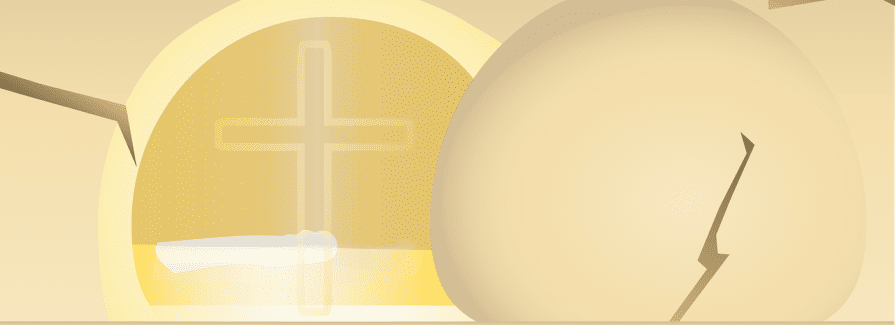 Each weekday for the next 14 days, Father James Lyons (Wellington) will be helping us reflect on God’s Word while we are in lockdown. What is God saying to us as we globally unite to defeat Covid-19?
Each weekday for the next 14 days, Father James Lyons (Wellington) will be helping us reflect on God’s Word while we are in lockdown. What is God saying to us as we globally unite to defeat Covid-19?
HOLY WEEK (2)
SETTING: darker colours – purple, scarlet… Pieces of greenery. A lit candle near the cross.
Opening Prayer:
I know the plans I have in mind for you –
plans for peace, not disaster, reserving
a future full of hope for you. [Jer.29:11]
Loving God, unfold your plans for us as we
struggle through this time of unknowing.
Strengthen our hope through our doubts and our fears.
As we follow the path of Jesus with his cross of isolation
may we never lose sight of the empty tomb beyond Calvary
and the peace and joy that shines from it.
Let this be our consolation, bringing trust and calm.
****
O God, who willed your Son to
submit for our sake
to the yoke of the Cross,
so that you might drive from us
the power of the enemy,
grant us, your servants, to attain
the grace of the resurrection.
Through Christ our Lord. Amen.
[Prayer of Holy Week Mass]
Scripture – Paul to the Philippians 2:6-11
His state was divine, yet Christ Jesus did not cling to his equality with God but emptied himself to assume the condition of a slave, and became as people are, and being as all people are, he was humbler yet, even to accepting death, death on a cross. But God raised him high and gave him the name which is above all other names, so that all beings in the heavens, on earth and in the underworld, should bend the knee at the name of Jesus, and that every tongue should acclaim Jesus Christ as Lord, to the glory of God the Father.
Recall the words of Micah about what Gods wants of us – to live justly, to love tenderly and to walk humbly with your God. [Micah 6:8]
Scripture – John 13:1-15
Read this passage twice, slowly, thoughtfully, in the style of Lectio Divina pattern. Spend time holding the words or phrases that leap out to you. What personal message do they have for you? What action or attitude does this passage suggest that might help you in this time of isolation and beyond it?
John’s gospel narrative does not relate the “institution of the Eucharist” at the Last Supper. In its place, but with the same authority and impact, we find the “Washing of feet”. The Do this in memory of me command of Jesus to the disciples, after sharing the bread and wine, is echoed in his admonition after washing their feet: If I, then, the Lord and Master, have washed your feet, you should wash each other’s feet. It is this imitation of Jesus that today’s theme calls you to dwell on as the lockdown period deepens and new challenges arise.
Washing
Dealing with the threat of Covid-19 requires a lot of washing, especially hand washing. The washing of feet symbolised service (at the time of Jesus it was the task of a slave or house servant). It also symbolised welcome. The roads were dusty and footwear either non-existent or very primitive. And walking, the most common way of getting around, was very tiring. To have your feet washed on arrival would be very refreshing and a great welcome gesture.
Because hands touch every part of the body, particularly the face, and also touch other bodies, places and objects, they can be carriers of disease. Because we are at present medically defenceless against Covid-19, the frequent washing of hands is a weapon we can’t afford to ignore.
Pilate also washed his hands [Matthew 27:24], not to escape a virus, but to signify he was not taking responsibility for the death of Jesus. We use the term today when we want to escape responsibility or disapprove of something – I’m washing my hands of this! we say.
Meditate quietly on Pilate’s action and your own “hand washing”.
- Are you always as eager to avoid being a carrier of disease as you are at this time of national crisis?
- What about the diseases of ill-temper, gossip, pride, misjudgement, prejudice… what sort of “hand washing” might help avoid these?
- When might have you “hand-washed” your way out of some responsibility that really was yours to own? Any resolve for the future?
The Rosary – The Mysteries of Light
Pope John Paul II named and inserted the Mysteries of Light into the Rosary in order to complete the life-cycle of Jesus. They provide contemplation on the public life of Jesus, from his baptism by John to the Last Supper.
The 5th Mystery of Light: The Institution of the Eucharist
It is appropriate to conclude this time of prayer with this particular decade which draws us to contemplate the tremendous love of Jesus for us, displayed just hours before his agony in the garden and arrest.
The Eucharist is gifted in the midst of uncertainty. The disciples were suspicious of one another as Jesus told them of a betrayer among them. They were overwhelmed and confused as they tried to absorb the lesson of the Jesus washing their feet. What he was sharing with them and telling them, including the instruction to Do this in memory of me would not have made sense till much later.
The Eucharist is the “light” of Christians, the meeting point of the faithful in communion with God and with one another. In contemplating this Mystery over a decade of prayer, the focus could be on thanksgiving – for the gift of Jesus, the gift of faith, of life, of each other – thanksgiving for everything and everyone that is part of creation and to which every individual is connected.
In this time of social isolation, itself a time of uncertainty, with churches closed and public Masses not being celebrated, many feel the lack of nourishment which the Eucharist brings, and thanksgiving may not come easily. But it can, if you see this time as one of appreciating the Eucharist anew, and preparing yourself for its return with hearts more grateful than ever.
Pray the decade of the Rosary in thanksgiving for this time apart, gifting you with time to know what you’re missing and to love all more dearly. This will also help you see other ways in which Jesus is showing his presence and his love. Ponder his promise, I will be with you always.




